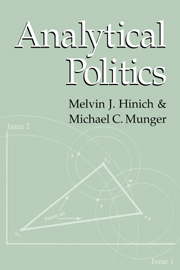6 - Uncertainty and policy preference
Published online by Cambridge University Press: 05 June 2012
Summary
Better it is to die, better to starve,
Than crave the hire which first we do deserve.
In this wolvish toge should I stand here,
To beg of Hob and Dick, that does appear,
Their needless vouches? Custom calls me to't;
What custom wills, in all things should we do't,
The dust on antique time would lie unswept,
And mountainous error be too highly heapt
For truth to o'er peer. Rather than fool it so,
Let the high office and the honour go
To one that would do thus. I am half through;
The one part suffer'd, the other will I do.
(William Shakespeare, Coriolanus, 1608, Act II, sc. III)Downs (1957) created the foundations of the classical model. But Downs clearly saw the need for a more comprehensive model. He tried hard to build better assumptions into his discussion of politics. As John Ferejohn points out:
The spatial metaphor has by now become such a common and powerful way of portraying electoral competition that students and journalists unselfconsciously depict electoral phenomena in its terms, without recognizing either its limitations or its foundational assumptions. But in his original introduction of the spatial model Downs is actually quite cautious with regard to the applicability of the spatial theory to actual elections. He spends a good deal of effort and space in his book examining the conditions under which electoral competition could be understood in terms of the spatial model.
- Type
- Chapter
- Information
- Analytical Politics , pp. 117 - 135Publisher: Cambridge University PressPrint publication year: 1997



